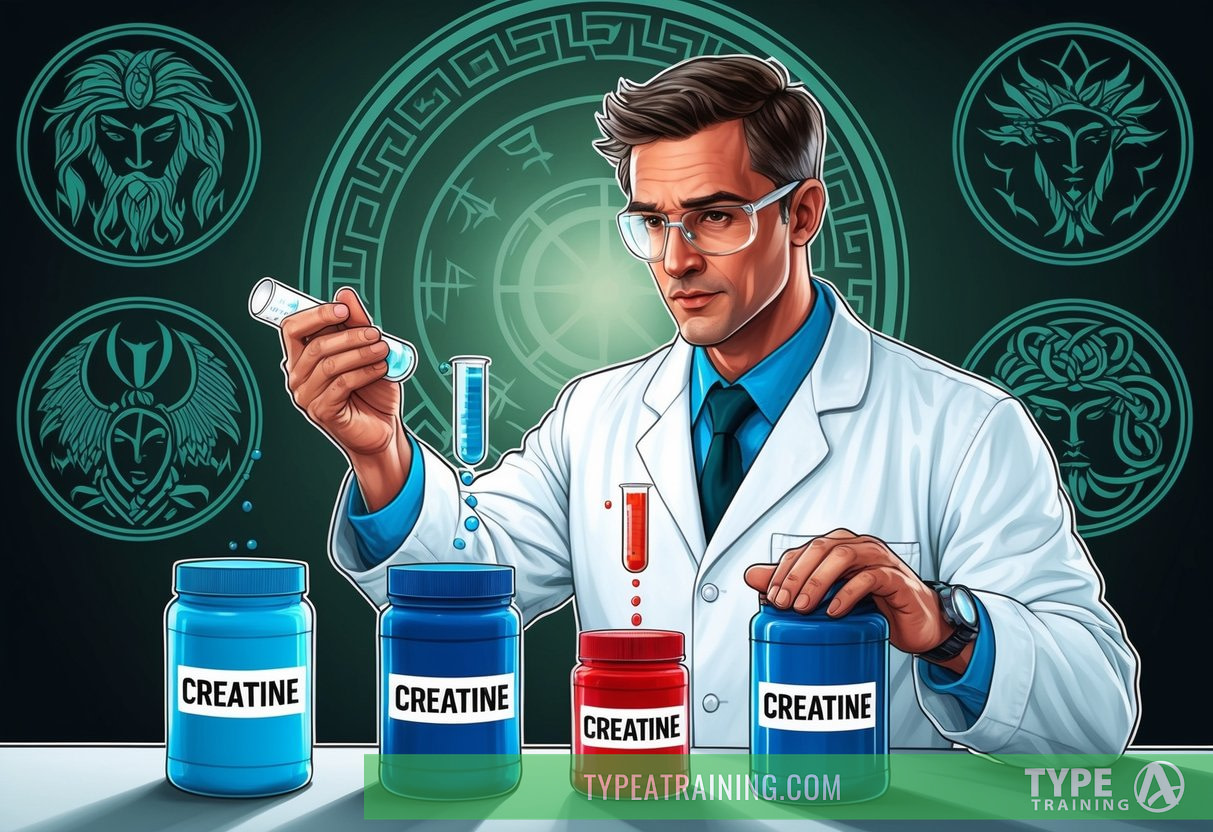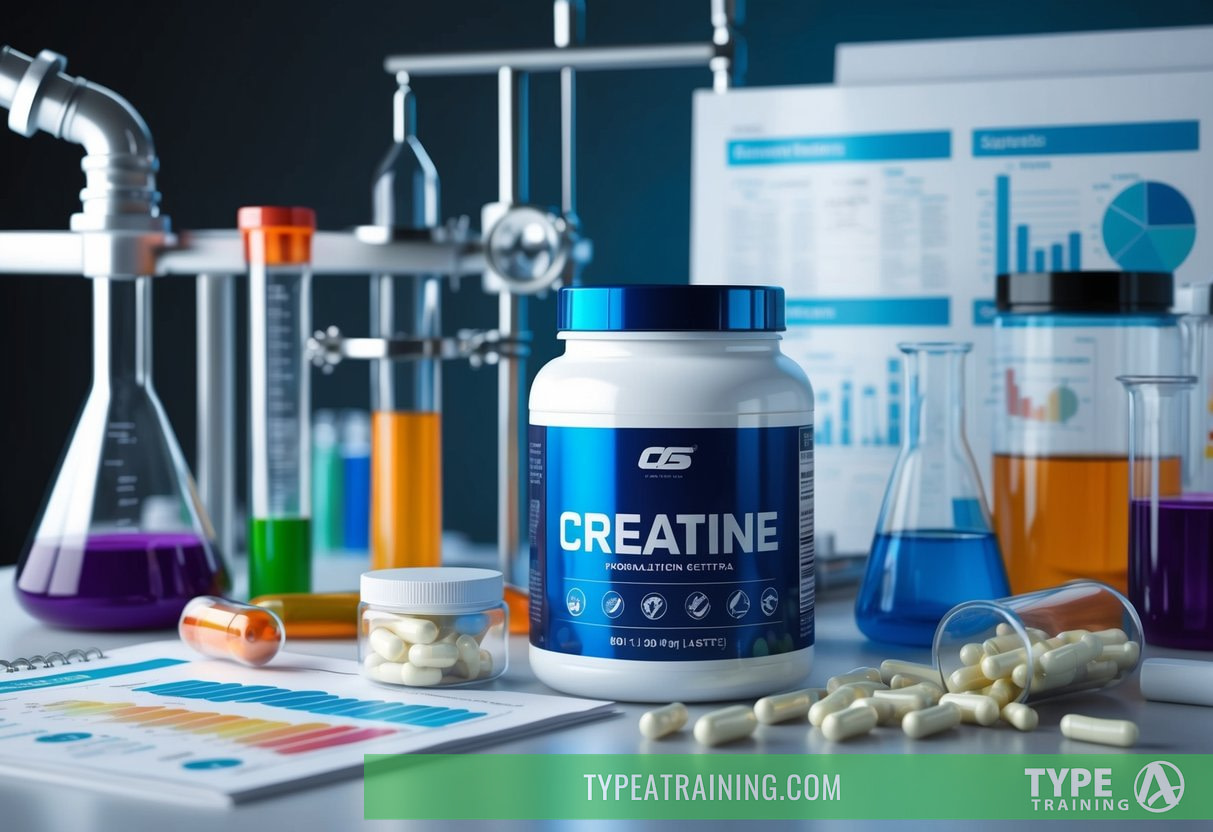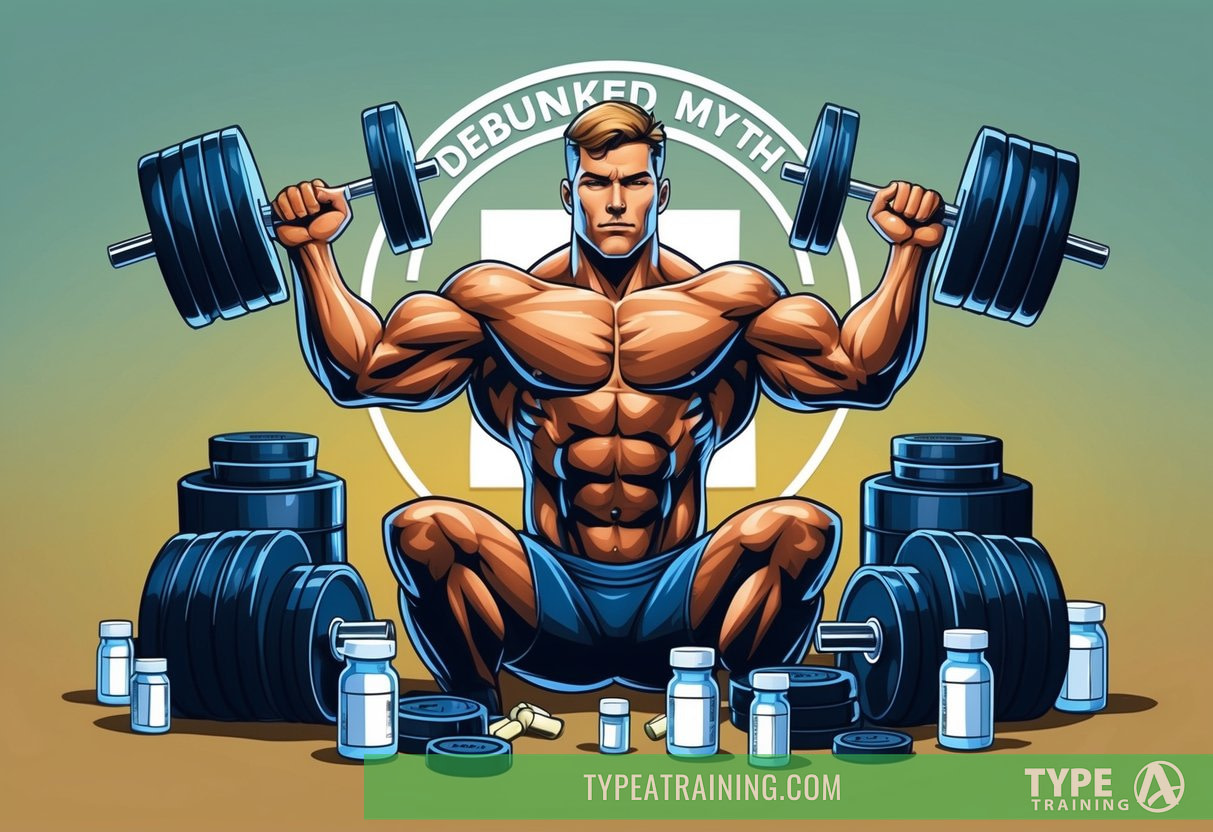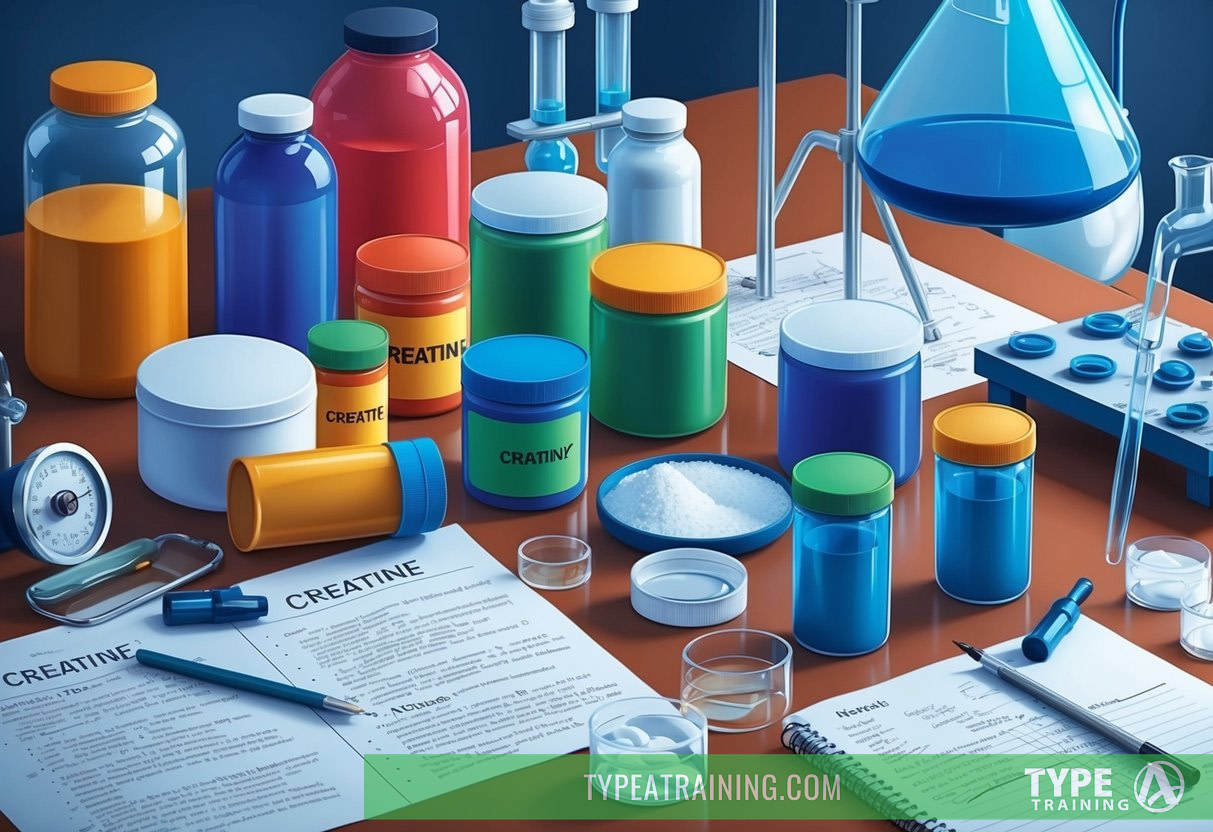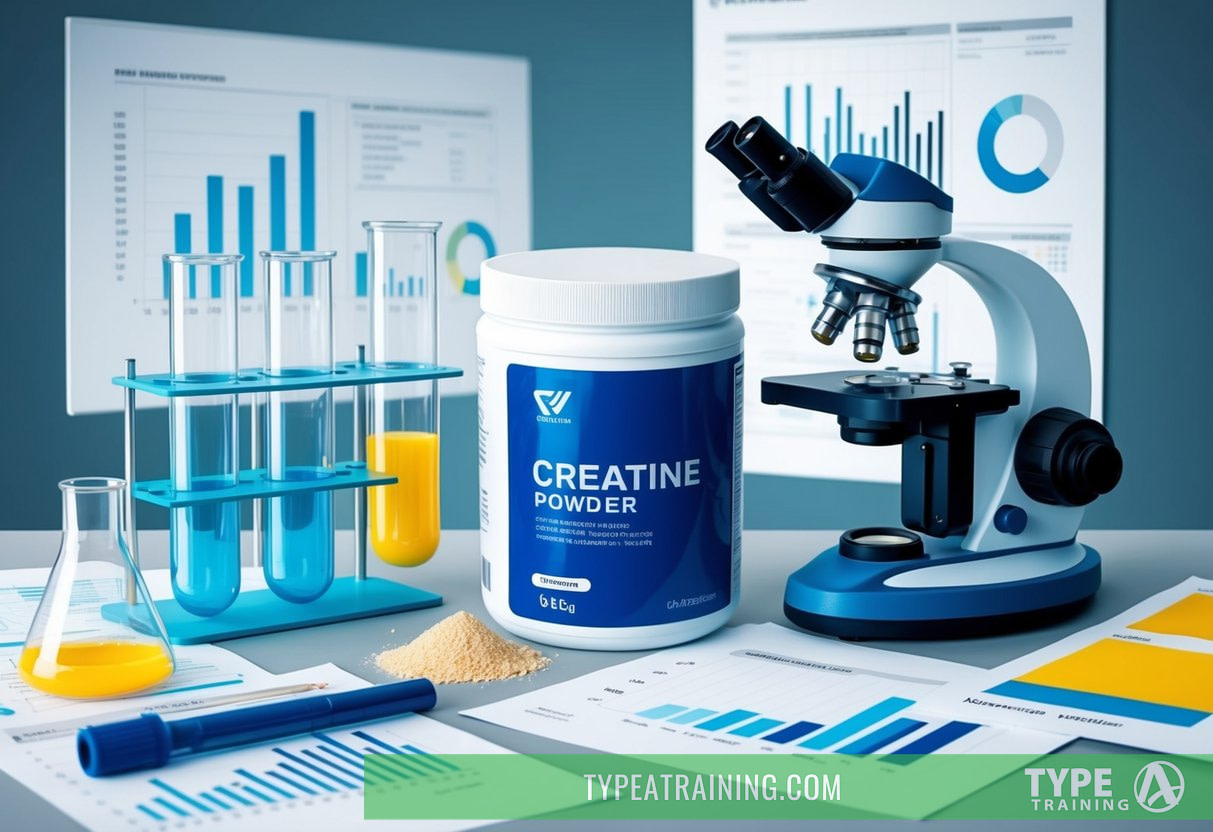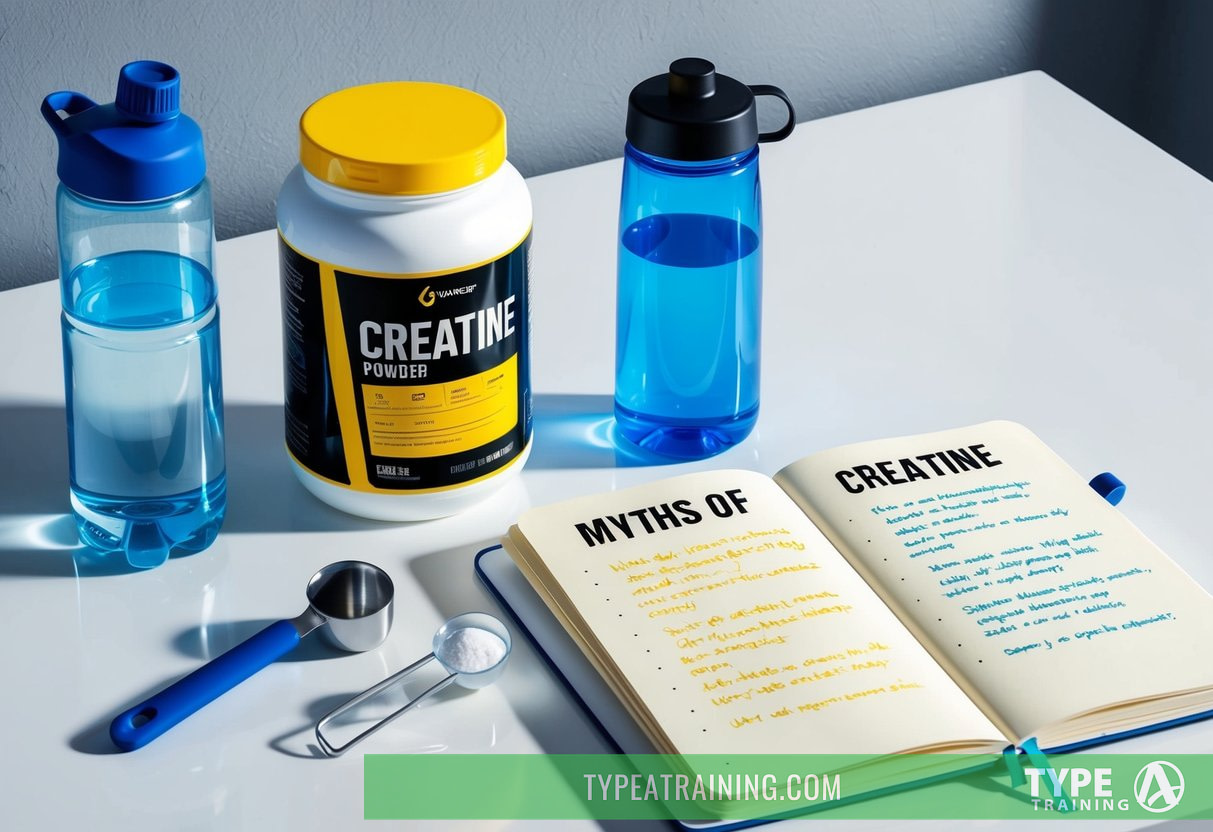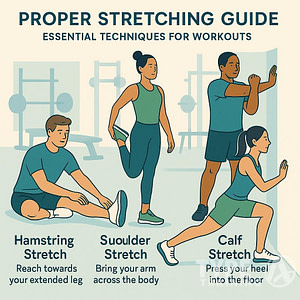Creatine is a powerful tool in the realm of sports nutrition and dietary supplements. Despite its widespread use, myths about creatine continue to circulate, causing confusion for those considering its benefits. The most important truth about creatine is that it’s safe when used as directed and provides numerous benefits beyond muscle growth.
Many Creatine Myths suggest that creatine is only suitable for athletes. In reality, even casual gym-goers can benefit from understanding the Creatine Myths surrounding this supplement.
Many assume creatine is only beneficial for bodybuilders or athletes focused on bulking up. This is far from the truth. Creatine supports a variety of physical activities by enhancing energy production in muscle cells, which can improve your overall exercise performance.
Popular posts:
By debunking the Creatine Myths, more individuals can safely incorporate creatine into their fitness routines.
Understanding the Creatine Myths surrounding its use is essential for making informed decisions about supplementation.
Misunderstandings about creatine, such as it being confused with anabolic steroids, need to be addressed. When you separate fact from fiction, you’ll see that creatine is a crucial part of a balanced sports nutrition plan, offering benefits that extend beyond strength training.
Addressing Creatine Myths can help clarify its role in sports nutrition.
Many of the Creatine Myths stem from misunderstandings about its effects and usage.
As we explore the topic of Creatine Myths, it’s crucial to rely on scientific evidence.
Key Takeaways
Recognizing these Creatine Myths can help dispel fears and misconceptions.
Many people remain unaware of the Creatine Myths that might influence their choices.
- Creatine is a safe dietary supplement for enhancing sports performance.
- It offers benefits beyond just muscle growth, aiding various physical activities.
- Creatine is not the same as anabolic steroids and should not be confused with them.
Understanding Creatine
In this section, we will also cover some common Creatine Myths that persist in the fitness community.
Creatine is a naturally occurring compound crucial for energy production in your body. It helps in regenerating adenosine triphosphate (ATP), the primary energy carrier, during high-intensity activities.
In this section, you’ll learn about what creatine is, its natural sources, and the different types of creatine supplements available.
In this section, we will debunk common Creatine Myths and clarify the truth.
Understanding the science behind Creatine Myths will empower better choices in supplementation.
What Is Creatine?
Creatine is a natural compound found mainly in your muscle cells. It plays a pivotal role in energy production, particularly in regenerating ATP, the molecule that supplies energy for muscle contractions.
When you engage in intense physical activities, ATP depletes rapidly, and creatine helps to quickly restore these energy levels, allowing you to sustain high performance.
This compound is synthesized in your body from amino acids, such as glycine and arginine. It’s stored mostly in muscles, with a small percentage found in the brain and other tissues.
It’s important to note that the body’s natural creatine production covers only a portion of what’s needed for maximum energy output, thus supplementation can be beneficial.
Natural Sources and Synthesis
You can obtain creatine directly from dietary sources like red meat and fish. These foods provide exogenous creatine that contributes to increasing the body’s creatine stores.
For individuals with dietary restrictions or specific fitness goals, relying solely on these natural sources might not be sufficient to reach desired creatine levels.
Endogenous production happens in your liver and kidneys. They synthesize creatine from precursor amino acids—glycine, arginine, and methionine.
Approximately one gram of creatine is produced in your body daily, complementing dietary intake. Awareness of these sources is valuable, especially if you’re considering increasing creatine intake through diet or supplements.
Types of Creatine Supplements
Creatine monohydrate is the most researched and widely used form of creatine supplements. Known for its efficacy, it is often the top choice for enhancing muscle mass and improving workout performance.
Other types include creatine hydrochloride, creatine ethyl ester, and buffered creatine. Each variant has its specific absorption rates and potential advantages, yet none have convincingly outperformed the benefits offered by creatine monohydrate. Understanding these options allows you to make informed decisions tailored to your fitness goals and dietary needs.
Health and Safety of Creatine Supplementation
Creatine supplementation is generally considered safe, with extensive research supporting its benefits and minimal risks. Key concerns involve long-term safety, effects on kidney function, and common misconceptions.
Understanding the Creatine Myths is vital for anyone considering supplementation.
By exploring Creatine Myths, we can facilitate informed decisions on supplementation.
Long-Term Safety
Long-term safety of creatine supplementation has been the subject of numerous studies. Research shows that using creatine for extended periods, even beyond six months, does not lead to adverse health effects for most individuals.
Scientific evidence supports its use, particularly among athletes and bodybuilders, to enhance muscle performance and strength.
Ongoing monitoring of users revealed no significant increase in risk for negative outcomes, provided that the recommended doses are followed.
Impact on Kidney Function
Concerns have been raised regarding creatine’s impact on kidney function. While creatine does lead to increased creatinine levels, a byproduct of its metabolism, this does not inherently indicate kidney damage or dysfunction.
Studies have shown that individuals with healthy kidneys can safely use creatine without experiencing adverse effects on kidney health. In contrast, people with pre-existing kidney problems should consult healthcare professionals before supplementation to ensure safety and appropriate usage.
Common Misconceptions
Several misconceptions about creatine are prevalent. One frequent myth is that it causes dehydration, though studies have not supported this when proper hydration is maintained.
Another common belief is that creatine leads to muscle cramps; however, this appears more anecdotal than scientifically validated.
Misunderstandings also extend to weight gain concerns, as creatine primarily causes initial water retention, not fat accumulation. Addressing these misconceptions can help users make informed decisions about incorporating creatine into their fitness regimen.
It’s essential to continue addressing the Creatine Myths that lead to confusion.
The Role of Creatine in Exercise
By focusing on the benefits of creatine while dispelling Creatine Myths, you can make better fitness choices.
Creatine plays a significant role in enhancing exercise performance, increasing muscle mass and strength, and supporting high-intensity workouts. Understanding its impact can help you make informed decisions about integrating this supplement into your fitness regimen.
Enhancing Athletic Performance
Creatine is widely recognized for its ability to enhance athletic performance. It helps to rapidly regenerate adenosine triphosphate (ATP), your muscles’ primary energy source during intense exercise.
By increasing ATP availability, creatine reduces fatigue and allows you to sustain more extended periods of high activity, such as sprinting or weightlifting.
This benefit is especially useful for sports requiring quick bursts of energy. Studies confirm that creatine supplementation can lead to noticeable improvements in both speed and power output.
If you’re an athlete looking to maximize your performance, incorporating creatine could provide a competitive edge.
Effects on Muscle Mass and Strength
One of the key benefits of creatine is its impact on muscle mass and strength. Creatine promotes water retention within muscle cells, which may make them appear larger.
Over time, this can lead to increases in muscle strength and size due to improved cellular hydration and protein synthesis.
Evidence suggests that consistent creatine use combined with resistance training results in greater muscle hypertrophy and strength gains compared to exercise alone.
As we discuss creatine, we must dispel the Creatine Myths that might deter potential users.
For those aiming to enhance muscle growth or boost their lifting capacity, creatine offers a scientifically-backed method for achieving noticeable results.
Creatine for High-Intensity Exercise
Creatine is particularly effective for high-intensity, short-duration activities. These types of exercises rely heavily on the ATP-PC energy system, which creatine efficiently supports.
By increasing phosphocreatine stores, it allows for faster ATP replenishment, essential for quick recovery between explosive movements.
Weightlifting, sprinting, and jumping are examples of activities that benefit most from creatine’s effects. If your workout routine focuses on high-intensity intervals or circuit training, creatine supplementation could enable you to perform at higher intensities with shorter rest periods. This enhanced recovery capability positions creatine as a valuable supplement for high-intensity exercise enthusiasts.
Moreover, addressing Creatine Myths can help athletes improve performance safely.
Creatine and Body Composition
Creatine plays a significant role in altering body composition by influencing factors like fat mass and lean muscle mass. It also demonstrates promising effects in combatting sarcopenia, particularly benefiting older adults.
Fat Mass and Lean Muscle
Using creatine supplementation can lead to notable body composition changes, often reflected in decreased fat mass and increased lean muscle mass.
Studies show that creatine, coupled with resistance training, enhances your muscle gains, allowing for a leaner body profile. This is largely because creatine aids in higher energy availability, enabling more intensive workouts.
As a result, your lean muscle mass increases, while overall fat mass tends to decrease.
Small weight gain is common due to increased water retention within muscle cells. This initial gain may result in a temporary uptick in body weight. Yet, over time, the addition of lean muscle mass helps balance or reduce the fat mass in your body. These changes boost your strength and improve your metabolic rate.
Combatting Sarcopenia in Older Adults
Our exploration of Creatine Myths continues as we uncover how it affects muscle retention.
Sarcopenia, or age-related muscle loss, can significantly impact older adults. Supplementing with creatine can be beneficial in mitigating this condition.
By promoting muscle retention and growth, creatine helps maintain lean muscle mass in aging populations.
Incorporating creatine alongside regular resistance exercises can enhance physical performance. It assists in preserving muscle mass, which is crucial for mobility and overall quality of life as you age.
This supplementation provides a valuable tool to counteract muscular decline, ensuring that older adults maintain an active, healthy lifestyle.
Debunking Creatine Myths
Furthermore, understanding Creatine Myths will allow users to maximize its benefits.
It’s important to address the various Creatine Myths that can mislead consumers.
When considering creatine supplementation, you may have encountered various myths that can cause confusion. Key misconceptions include beliefs about water retention, hair loss, and associations with anabolic steroids.
Water Retention and Bloating
One common misconception is that creatine causes excessive water retention and bloating. This belief stems from creatine’s role in drawing water into muscle cells, which can increase body weight.
Let’s clarify some of the most common Creatine Myths regarding water retention.
However, this weight gain is often due to increased muscle hydration rather than significant bloating.
You might notice a slight increase in body mass initially, usually around 1-2 kilograms. This is typically temporary and reflects enhanced muscle energy reserves. Proper hydration and dosage management can minimize any discomfort.
The positive aspect of this effect is that it often contributes to improved performance and muscle endurance.
Hair Loss and Baldness
Another prevalent myth suggests that creatine causes hair loss or baldness. This stems largely from a study indicating that creatine intake might increase levels of dihydrotestosterone (DHT), a hormone linked to hair thinning. However, this study had limitations and did not establish a direct cause-and-effect relationship between creatine and hair loss.
Another prevalent Creatine Myth is its supposed link to hair loss.
Current scientific evidence does not conclusively support the claim that creatine contributes to baldness. The myth persists mainly due to a lack of comprehensive research confirming or discrediting any association.
If hair loss is a concern, it might be beneficial to monitor DHT levels or consult a healthcare provider while using creatine supplements.
Confusion with Anabolic Steroids
Creatine is sometimes mistakenly associated with anabolic steroids, partly because of its popularity among bodybuilders and athletes.
Disentangling the Creatine Myths from reality is crucial for informed use.
Creatine is a naturally occurring compound in the body that helps regenerate ATP, providing quick energy bursts for short, high-intensity activities. Unlike steroids, creatine does not directly influence hormone levels and carries no legal or ethical usage restrictions in sports.
This myth might deter some from using creatine due to the negative reputation often associated with anabolic steroid usage. Understanding the distinction between creatine and anabolic substances is crucial.
Overall, tackling Creatine Myths provides clarity and promotes healthy supplement practices.
Creatine has a well-documented safety profile and has been used extensively in sports nutrition without the adverse effects linked to steroid use.
Mixing Creatine and Caffeine: Pros, Cons, and Bulletproof Coffee Insights
Enhanced Performance Benefits:
Mixing creatine and caffeine, especially in the form of Bulletproof Coffee, may significantly boost athletic performance.
Creatine is well-known for its ability to increase strength and power output, making it particularly beneficial for high-intensity activities like weightlifting and sprinting.
Caffeine, found in coffee, can improve endurance and delay fatigue, allowing athletes to train longer and harder.
When combined in Bulletproof Coffee, which also includes healthy fats, the caffeine enhances focus and mental clarity during workouts.
This combination may create a synergistic effect, helping athletes reach their fitness goals more effectively.
Potential Side Effects:
While mixing creatine and caffeine can offer numerous benefits, it’s essential to consider the potential side effects.
Some individuals may experience gastrointestinal discomfort, such as bloating or cramping, particularly if they consume high doses of either supplement.
Additionally, the combination may lead to dehydration, as both creatine and caffeine can have diuretic effects.
Increased heart rate is another concern, especially for those sensitive to caffeine.
Many Creatine Myths suggest it has adverse effects, which we will explore.
These side effects can vary from person to person, so it’s crucial to monitor your body’s response and adjust your intake accordingly.
Timing and Dosage Considerations:
When it comes to the timing and dosage of mixing creatine and caffeine in Bulletproof Coffee, careful planning is vital for maximizing their benefits.
It is generally recommended to take creatine consistently, ideally loading it for the first week, followed by a maintenance dose.
For caffeine, consuming Bulletproof Coffee about 30-60 minutes before a workout can enhance its effectiveness.
However, some studies suggest that taking caffeine immediately before or after creatine may diminish its benefits.
Finding the right balance in timing and dosage is key to optimizing performance while minimizing potential side effects.
Confusion with Anabolic Steroids
Creatine is frequently mistaken for anabolic steroids, yet they function in distinct ways. Creatine is an amino acid derivative supporting energy production in muscles, while anabolic steroids are synthetic substances that mimic testosterone, encouraging muscle growth by enhancing protein synthesis.
Key Differences:
-
- Functionality: Creatine provides energy to muscles by increasing phosphocreatine stores, aiding in short bursts of high-intensity exercise. Anabolic steroids boost muscle size and strength through hormone-like actions.
Understanding the differences can help clear up Creatine Myths related to its function.
- Safety and Legality: Creatine is a legal dietary supplement with robust scientific backing for its safety and efficacy in enhancing athletic performance. In contrast, anabolic steroids are often controlled substances due to potential health risks and their impact on hormone balance.
Myths and Misunderstandings
A widespread misconception equates creatine with steroids due to similar effects on muscle mass and strength. This misconception exaggerates the potential risks associated with creatine use. In reality, creatine has a well-established safety profile when used appropriately.
Many Creatine Myths contribute to misunderstanding its safety and efficacy.
Resources like Optimum Nutrition clarify that creatine is fundamentally different from anabolic steroids, making it a safe supplement for various users.
Benefits without Risks
Creatine offers benefits without the severe side effects linked to anabolic steroids. It is widely adopted among athletes and fitness enthusiasts for its ability to improve performance and increase muscle mass.
These Creatine Myths often exaggerate the risks and downplay the benefits.
Unlike anabolic steroids, which can lead to significant health issues, creatine use aligns with safe supplement practices. For accurate information, resources like Burn Bootcamp explain the differences and debunk myths surrounding creatine and steroids.
Optimizing Creatine Usage
To effectively enhance the benefits of creatine supplementation, focus on proper dosing and timing, consider combining it with complementary supplements, and ensure adequate hydration to maximize creatine’s impact on muscle hydration and metabolism.
Effective Dosing and Timing
Finding the right creatine dose is crucial for maximizing benefits without overconsumption.
A common approach is starting with a loading phase, where you consume 20 grams of creatine daily for 5-7 days, divided into four 5-gram doses. This saturates your muscles with creatine phosphate quickly.
After the loading phase, a maintenance dose of 3-5 grams per day is sufficient.
Take creatine either before or after workouts. Some evidence suggests post-workout is slightly more beneficial. Consistent daily intake, regardless of timing, helps maintain elevated muscle creatine stores for improved energy and performance.
Combination with Other Supplements
Combining creatine with other supplements can enhance its effectiveness.
Pairing it with carbohydrates and proteins aids in boosting insulin levels, facilitating better creatine uptake in muscles.
Supplements like whey protein can improve muscle gains and support protein synthesis when taken with creatine.
Beta-alanine is another supplement that works well with creatine, especially in enhancing endurance and reducing muscle fatigue. A balanced combination supports improved workout performance and recovery, helping to optimize your training results.
Hydration and Creatine
Proper hydration plays a vital role in maximizing creatine’s effects.
Since creatine draws water into muscle cells, staying well-hydrated supports muscle hydration and function.
In addition, awareness of common Creatine Myths will improve overall usage.
Aim to drink plenty of water throughout the day, especially pre- and post-workout, to counter any dehydration.
Inadequate hydration can impede creatine absorption and potentially lead to muscle cramps. Drinking fluids throughout the day also supports metabolism, enabling your body to utilize creatine effectively for energy production and muscle endurance.
Addressing these Creatine Myths helps ensure proper usage and understanding.
Confronting Creatine Myths is essential for adopting a sound supplementation approach.
Benefits Beyond Muscle
Creatine is commonly associated with muscle growth, but it offers advantages that extend beyond just physical performance. Its impact on cognitive function and potential benefits for recovering patients are significant.
Creatine and Cognitive Function
Creatine supplementation has shown promise in enhancing cognitive performance, making it a topic of interest for those seeking mental benefits.
Studies indicate that creatine can improve working memory and intelligence, particularly in situations of mental fatigue. This improvement may be due to creatine’s role in energy metabolism within the brain.
For individuals under high cognitive stress or those with shorter sleep durations, creatine may help maintain mental clarity.
Its influence on neurotransmitter levels and brain energy supply underscores its potential as a cognitive enhancer.
By dispelling Creatine Myths, we can focus on its true potential.
These effects make creatine supplementation an intriguing option for those seeking brain health benefits.
Potential Benefits for Recovering Patients
By understanding the reality behind Creatine Myths, you can also enhance cognitive function effectively.
Beyond its use in sports, creatine has been explored for its potential benefits in recovery from muscle injuries or illnesses.
It may aid in muscle recovery by improving muscle energy stores, which are essential during the healing process. This can be valuable for patients rehabilitating from surgery or musculoskeletal injuries.
Creatine may also support recovery after traumatic or neurological injuries.
Ultimately, recognizing Creatine Myths assists in developing better recovery strategies.
Understanding and addressing Creatine Myths can enhance recovery strategies.
By enhancing cellular energy levels, it could help accelerate the repair process and reduce recovery time.
These effects suggest that creatine might be a useful adjunct in rehabilitation programs, offering benefits that extend beyond traditional treatment approaches.
Practical Tips for Creatine Supplementation
Similarly, addressing Creatine Myths fosters a supportive environment around fitness.
In conclusion, being aware of Creatine Myths allows for better supplementation practices.
When considering creatine supplementation, start with a loading phase. This typically involves taking 20 grams per day, divided into 4 servings, for 5-7 days. After this phase, maintain your creatine levels by taking 3-5 grams daily. This method can help you achieve optimal saturation in your muscles.
Ensure you are well-hydrated to prevent potential side effects such as dehydration and muscle cramps.
Drink plenty of water throughout the day, especially after taking the supplement. Staying hydrated helps in the efficient processing of creatine in your body and supports overall performance.
Including creatine as part of your dietary supplement regimen can help reduce fatigue during intense workouts.
By navigating Creatine Myths, you can prevent dehydration and other issues.
It’s known to support energy production, making it suitable for both short bursts of activity and prolonged exercise routines. You might observe improvements in strength and endurance with consistent use.
Consider timing your creatine intake, as it can be effective either pre- or post-workout.
Some users prefer to mix it with a post-exercise meal or shake, which can aid in muscle recovery. It’s not necessary to take creatine at a specific time, but consistency in daily intake is key.
A common myth is that creatine causes immediate weight gain due to water retention.
While you may notice slight water retention initially, this often normalizes. Ensure a balanced diet and monitor your progress to address any concerns related to bloating or weight fluctuations.
While addressing Creatine Myths, clarify your own hydration practices.
Avoiding cramping is crucial for athletes, and creatine doesn’t inherently increase muscle cramps when used correctly.
If cramps occur, evaluate your hydration and mineral intake, as these factors can significantly impact your comfort and performance.
Should Women Take Creatine?
Pros and Cons
Creatine offers women numerous benefits including increased strength and power output, enhanced muscle growth and recovery, improved cognitive function, proven long-term safety, and no negative impacts on hormonal balance. However, potential downsides include possible initial water retention, the need for consistent daily supplementation to maintain results, and the persistence of misleading gender-specific marketing that may create unnecessary hesitation among female users.
Performance Benefits
Women experience significant performance improvements with creatine supplementation, including enhanced strength, power output, and high-intensity exercise capacity. Research shows that creatine helps women achieve greater training volume and intensity, leading to more productive workouts and better overall fitness progression. These benefits are particularly valuable for strength athletes, CrossFit competitors, and women engaged in high-intensity interval training.
Body Composition Advantages
Contrary to outdated myths about “bulking,” creatine helps women achieve lean, defined physiques by enhancing muscle quality rather than creating excessive size. Studies demonstrate that women using creatine experience improved body composition with greater lean muscle mass and reduced fat percentage. This makes creatine an excellent supplement for women pursuing aesthetic fitness goals alongside performance improvements.
Hormonal and Reproductive Health
Research indicates creatine may offer unique benefits for women’s hormonal health, potentially supporting healthy hormone balance and reproductive function. Women naturally have lower baseline creatine stores than men, making supplementation potentially more impactful. Some studies suggest creatine may help mitigate symptoms during specific phases of the menstrual cycle and could support overall metabolic health—benefits that extend well beyond the gym.
Cognitive and Mood Support
Importantly, tackling Creatine Myths will help you maintain balance in supplementation.
Perhaps most surprisingly, creatine demonstrates significant cognitive benefits for women, including improved memory, mental processing speed, and mood regulation. These neurological advantages make creatine valuable for women of all activity levels, not just athletes. The brain-boosting effects can enhance work performance, focus, and overall mental well-being while reducing mental fatigue during demanding tasks.
Read more: Best Supplements for Women’s Health
With a focus on Creatine Myths, we can explore various aspects of creatine supplementation.
| Recommended Dosage | Best Form | Timing | Expected Results |
|---|---|---|---|
| 3-5g daily | Creatine monohydrate | Any time of day, consistent daily use | Benefits begin within 1-4 weeks |
Choosing the Right Creatine Supplement: Key Factors to Consider
Optimal Dosage
Research consistently shows that 3-5 grams of creatine monohydrate daily is the sweet spot for effectiveness. This recommended range provides maximum benefits without unnecessary excess, supporting your fitness goals efficiently.
Form Matters
Seek out micronized creatine supplements, which feature finely ground particles that enhance absorption. This superior formulation not only improves your body’s utilization of the supplement but can also minimize digestive discomfort that some users experience.
As we consider purity, we must also dispel any surrounding Creatine Myths.
Purity Is Priority
While creatine monohydrate should be the primary ingredient, many products contain additional fillers or additives. For best results, prioritize pure, single-ingredient formulations that deliver creatine without unnecessary extras.
Verified Quality
Select supplements that have undergone rigorous third-party testing from respected organizations like NSF International or Informed Sport. These certifications verify the product’s quality, purity, and safety—giving you confidence in what you’re consuming.
Remember that consistency is crucial for creatine effectiveness. Choose a product you find palatable enough to take regularly. As with any supplement regimen, consult your healthcare provider about any medical concerns before beginning.
Best Creatine Supplements
About Third-Party Testing and Its Importance
While the FDA doesn’t verify supplement ingredients directly, they prohibit false marketing claims. Many reputable companies voluntarily undergo third-party testing to validate their products’ contents and safety through independent laboratory analysis.
Third-party verification is crucial for several reasons:
- Provides unbiased confirmation that ingredients match label claims
- Ensures products are free from undisclosed compounds and contaminants
- Essential for athletes needing certification that supplements contain no banned substances
- Offers consumers greater transparency and peace of mind
All protein powders recommended in this post have undergone rigorous third-party testing to validate their label claims, purity, and safety—a critical criterion in my supplement evaluation process.
Leading Third-Party Testing Organizations:
- NSF International: Offers the gold-standard NSF Certified for Sport program, testing for banned substances, purity, and label accuracy
- Informed-Choice: Well-established certification covering ingredients, labeling, and banned substance analysis
- LabDoor: Independent lab conducting thorough testing for purity and content verification
- Eurofins: Global analytical leader with extensive contaminant screening capabilities
- ConsumerLab.com: Trusted source for independent evaluation of supplement quality and labeling accuracy
Other reputable certifying bodies include UL, TÜV Rheinland, and AOAC International, all offering comprehensive third-party testing services.
$43.00
$14.99$11.24
$34.99
$49.99$45.00
$39.80
$51.05
Best Choice
07/11/2025 06:20 am GMT
|
$43.00
|
|
$34.99
|
|
$39.80
|
$51.05
|
Thorne Creatine Powder
Thorne Creatine delivers exactly what serious athletes need: 5 grams of pure, micronized creatine monohydrate with zero fillers or additives. Its NSF Certification for Sport ensures it meets rigorous quality standards and is free from banned substances—critical for competitive athletes. At under 50 cents per serving, it offers exceptional value without compromising quality.
As my personal go-to supplement for nearly two years, I can attest to its superior mixability, truly neutral taste, and complete absence of the gritty texture common in many creatine products. The brand’s reputation among elite athletes is well-deserved, with official partnerships with the UFC Performance Institute and widespread adoption among professional MMA fighters.
For those new to performance supplementation, Thorne represents an ideal entry point. Their science-backed formulations prioritize clean, minimal ingredients with proven efficacy and safety profiles—exactly what you want in a daily performance supplement.
Onnit Creatine Monohydrate
Onnit delivers 5 grams of pure micronized creatine monohydrate per serving with zero additives—no flavors, no fillers, just high-quality creatine. The compact container is perfect for those wanting to sample creatine without committing to a larger tub, and its portable size makes it ideal for tossing into your gym bag for post-workout supplementation.
One of its standout features is the exceptional mixability—it blends seamlessly into any liquid without the clumping issues common with many creatine products. Whether in coffee, water, juice, or protein shakes, it incorporates perfectly every time. “I’ve been taking Onnit’s creatine for years. It’s still my creatine of choice,” says MH Fitness Director Ebenezer Samuel, C.S.C.S.
Quality assurance is guaranteed through its Informed Sport certification, verifying that each batch undergoes rigorous testing for banned substances and contaminants—essential for competitive athletes and those seeking guaranteed purity.
Bare Performance Nutrition Creatine Monohydrate
Bare Performance Nutrition delivers premium quality with their pure Creapure micronized creatine monohydrate, featuring just a single, high-quality ingredient. Founded by Army veteran and hybrid-athlete Nick Bare, this brand has established itself as a leader in performance supplements through its commitment to quality and efficacy.
The product’s Informed Sport certification ensures each batch undergoes rigorous testing for banned substances—providing peace of mind for competitive athletes and serious fitness enthusiasts alike. Its stackable container design integrates seamlessly with other supplement tubs, maintaining organization in your supplement cabinet.
What truly sets this creatine apart is its exceptional mixability. Through extensive testing in various liquids including water, juice, smoothies, and even coffee, it consistently dissolves effortlessly without clumping. The formulation leaves no chalky texture or unpleasant aftertaste, making daily supplementation easy and enjoyable.
Transparent Labs Creatine HMB
Transparent Labs Creatine HMB delivers a premium formula that goes beyond basic creatine supplementation. Each serving provides 5 grams of high-quality creatine monohydrate enhanced with 1.5 grams of HMB (β-Hydroxy β-methylbutyric acid), along with vitamin D and BioPerine for improved absorption and effectiveness.
The standout quality of this supplement is its exceptional mixability. Unlike many creatine products that require vigorous shaking or blending, this formula dissolves almost instantly in liquid with minimal effort. Simply add a scoop to water, juice, or your post-workout shake, and it integrates seamlessly without clumping or grittiness.
While the price point is higher than standard creatine monohydrate supplements, the addition of HMB potentially offers enhanced benefits for muscle recovery and strength gains. The product’s Informed Sport certification provides assurance of quality and purity—essential for competitive athletes and those seeking guaranteed supplement safety.
For maximum benefit, this creatine works exceptionally well mixed into post-workout protein smoothies, delivering a comprehensive recovery formula in one convenient serving.
Momentous Creatine
Momentous Creatine stands out as an exceptional option for athletes seeking maximum quality assurance with its rare dual certifications—both NSF and Informed Sport verified. This double certification means each batch undergoes rigorous testing for over 200 banned substances, making it ideal for competitive and professional athletes concerned about supplement purity.
At just 41 cents per serving, this product delivers premium quality at a mid-range price point. The 90-serving package provides excellent long-term value, lasting most users at least three months of consistent supplementation.
While the product isn’t micronized (meaning it may require more thorough mixing than some competitors), the slight inconvenience is offset by its exceptional purity and quality control standards. The resealable bag format saves cabinet space compared to rigid containers, though some users may find the closure mechanism slightly cumbersome.
The brand recommends a 10-gram loading phase during the first week, but current research suggests this accelerated approach offers minimal additional benefits for most users. Sticking with the standard 5-gram daily serving provides the same long-term results without depleting your supply prematurely.
Optimum Nutrition Micronized Creatine Monohydrate Powder
Optimum Nutrition delivers a straightforward, highly effective creatine supplement with their industry-leading micronized powder, offering unmatched value with 240 full servings of pure creatine monohydrate in an unflavored formula that dissolves easily and mixes with virtually any beverage, though the large container size may be impractical for some users and occasional clumping can occur if not stored properly.
Industry-Leading Quality
Optimum Nutrition’s micronized creatine monohydrate represents the gold standard in purity and effectiveness. Each serving delivers precisely 5 grams of 99.9% pure creatine—the most extensively researched dosage for enhancing strength, power, and muscle development. The micronization process creates ultra-fine particles that dissolve more readily and may improve absorption compared to standard creatine powders.
Exceptional Value
With an impressive 240 servings per container, this offering provides exceptional long-term value. At approximately 12-13 cents per serving, it ranks among the most cost-effective ways to supplement with high-quality creatine. The substantial 1200-gram container typically lasts 6-8 months for most users, eliminating the need for frequent reordering.
Versatile Application
The unflavored formula mixes easily into virtually any beverage without altering taste or texture. This versatility allows seamless incorporation into pre/post-workout shakes, juice, water, or even food recipes. The neutral profile ensures you can maintain your supplementation routine regardless of flavor preferences or dietary restrictions.
Brand Reliability
As the industry’s most recognized sports nutrition brand, Optimum Nutrition maintains rigorous quality control standards and banned substance testing protocols. Their manufacturing facilities operate under strict guidelines to ensure consistency and purity across every batch—critical considerations for serious athletes and fitness enthusiasts who rely on supplement efficacy and safety.
Frequently Asked Questions
Below, common questions about creatine are addressed to provide clarity based on current scientific evidence.
What are the common misconceptions about the safety of creatine supplementation?
One of the main misconceptions is that creatine supplementation is unsafe for the average person.
Research indicates that creatine is safe when used correctly. It is often assumed that creatine leads to dehydration, muscle cramps, or injury, but studies show such effects are not typical when proper dosage guidelines are followed.
How does creatine impact kidney function and what does the research say?
Some believe that creatine negatively affects kidney function.
However, various studies report that creatine does not impair kidney function in healthy individuals. Those with pre-existing kidney conditions should consult healthcare professionals before starting creatine. Evidence suggests creatine use is tolerated well in most cases.
Are there any proven side effects associated with long-term creatine use?
Long-term use of creatine has been extensively studied.
There is little evidence of harmful side effects in healthy adults when consumed at recommended doses. Most users experience minimal issues, though it’s crucial to maintain adequate hydration and follow dosing instructions.
What does scientific evidence suggest about the necessity of a creatine loading phase?
Explore Creatine Myths related to the necessity of a loading phase.
A common belief is that a loading phase is essential to experience benefits.
While it can rapidly increase muscle creatine stores, studies have shown that the same results can be achieved without loading by taking a consistent lower dose over a longer period.
Is there a consensus in scientific research regarding the efficacy of creatine for muscle growth?
Research consistently supports creatine’s effectiveness in enhancing muscle growth and strength.
Numerous studies highlight improvements in muscle mass when creatine is used alongside resistance training. This has made it a popular supplement among athletes and bodybuilders aiming for muscle growth.
What are the main arguments presented by critics of creatine supplementation?
Critics often argue that creatine might not work for everyone. They allude to non-responders who don’t notice any benefits. Additionally, some express concerns over potential side effects. Yet, substantial research supports creatine’s benefits and safety profile. Any supplement-related decisions should be tailored to individual needs and health conditions.

